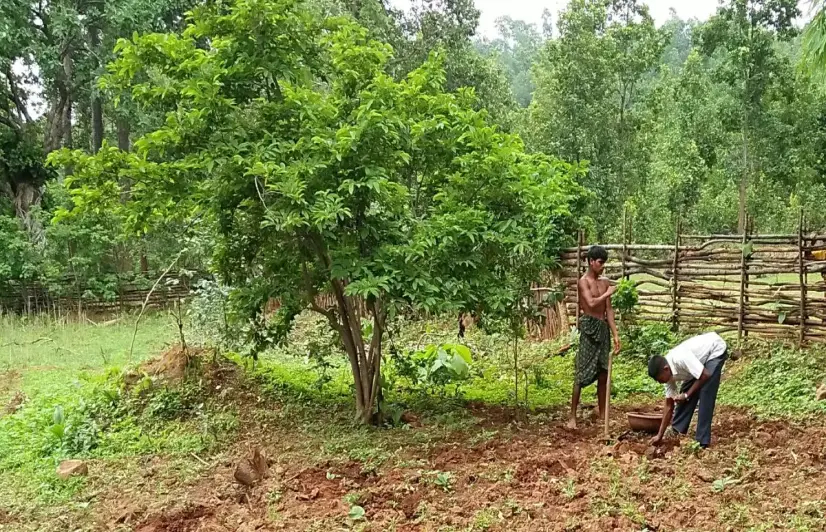Odisha tribals take fight against malnutrition to their backyards

Odisha tribals take fight against malnutrition to their backyards
Parbati Digal from Rajupadar village of Kotagada block prepared beds for her kitchen garden (Photo: Maldhar Naik)
Tribals of 267 villages in the remote areas of Kotagada and Tumudibandha block in Odisha have developed more than 2,120 kitchen gardens in five years. This assures them a nutritious diet, raising hopes of overcoming severe malnutrition in Kandhamal.
Kandhamal, Odisha: Lima Majhi, 35, proudly surveys her 300 square feet kitchen garden at Sushabhata village in Kandhamal, Odisha. The green patch has 14 varieties of fruits and vegetables such as bitter gourd, beetroot, cucumber, pumpkin, drumstick, tomato, coriander, radish, parwal (pointed gourd), brinjal, and chilly.
In Kandhamal, at least, this knowledge is critical.
Supplementing support
"Malnutrition is more than lack of food, and tribals are traditionally agrarian communities who grow vegetables and fruits. So, there is no visible hunger among these communities,” said Ruchi Kashyap, Executive Trustee at Atmashakti Trust. “But, they do not know what a varied diet is and what fruits and vegetables will meet their nutritional needs. So, we used a behavioural change communication approach to overcome this challenge. We helped communities know food diversity, the technique to grow a kitchen garden, and avail of government schemes such as Mo Upakari Bagicha, Millets Mission, and Iron Plus Initiative to make this effort sustainable and beneficial,” she said.
The state government too has recognised and supported these kitchen gardens over the years. In 2018, Odisha Livelihoods Mission (OLM), in partnership with Azim Premji Philanthropic Initiatives (APPI), implemented a nutrition project called ‘Mo Upakari Bagicha' to spread the knowledge of nutritional outcomes from dietary diversity by promoting kitchen gardens in rural households across the state.
Rita Majhi from Pagarpadi village has benefited from the surplus produce in her NKG (Photo: Santanu Patra)
In June 2020, OLM converged with MGNREGA to scale up nutritional kitchen gardens in all 314 blocks with an additional budgetary allocation of Rs 500 crore from the Odisha government. The aim was to reach 5 lakh households in the financial year 2020-21 with a focus on Scheduled Caste, Scheduled Tribes, Below Poverty Level (BPL) households, beneficiaries of rural housing, and small and marginal farmers.
Santosh Kumar Rath, District Project Manager of OLM in Kandhamal said in an effort to reduce undernutrition among children, women of reproductive age groups and adolescent girls, "in the last financial year, we have helped over 24,000 families build kitchen gardens in Kandhamal.”
According to the National Family Health Survey (NFHS-5) 2019-21, stunting in Kandhamal has decreased significantly from 38.4 per cent to 34.2 per cent in NFHS-4 (2015-2016); the percentage of underweight children has reduced from 43.1 per cent to 35.40 per cent, and there has been a marginal improvement in the figures on wasting disease but these figures are all still below the state average.
Delinking nutrition and poverty
Odisha is also rated among the top 10 states with a substantial share of the population living in poverty as per the report of NITI Aayog's National Multidimensional Poverty Index (MPI) 2021. One in every two people (44.75%) in Kandhamal is below the poverty line.
"Nutritional kitchen gardens can play the role of inflation insulation for them as vegetable prices remain high all through the year," said Panda.
Kitchen gardens are vital to cater to the villagers' nutritional needs by providing access to food that is harvested, prepared, and consumed by family members.
Sindhimai Patmajhi, 55, from Badjal village under Jubaguda Gram Panchayat in Kotagarh block, grows papaya, drumstick, banana, lemon, radish, guava, carrot, pineapple, brinjal, beans, cucurbit, cabbage, cauliflower, and beet nutritional kitchen garden. She said her frequent visits to the hospital have reduced drastically in the past two years after eating vegetables every day.
Compost being prepared for use in kitchen gardens (Photo: Maldhar Naik)
“The members of Jeebika Suraksha Manch explained to us the nutritional value of each fruit and vegetable. They asked us to grow vegetables and fruits so that we readily get the required nutrition in our food,” she said.
Although Patmajhi and her husband earned through Mahatma Gandhi National Rural Employment Guarantee Act (MGNREGA), it was a meagre amount. With the flourishing kitchen garden, they do not have to worry about nutritious food.
An increase of vegetable yield has ensured that the villagers are not only consuming healthy food but also earning by selling the surplus.
“This year, we have received an additional income of around Rs 6,500 by selling surplus vegetables. This helped our family build another room in our house,” said Rita Majhi, 28, from Pagarpadi village under Guma Gram Panchayat of Tumudibandha block.
The visible results of the kitchen gardens have motivated other non-beneficiary farmers and women to create these in their communities and homes.
Edited by Shobha Kiran Surin
Would you like to Support us
101 Stories Around The Web
Explore All NewsAbout the Reporter
Write For 101Reporters
Would you like to Support us
Follow Us On



.png)
